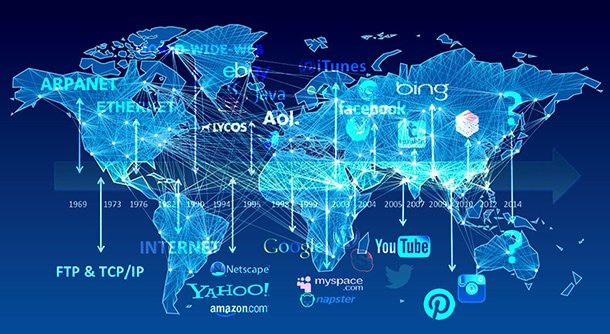The internet has come a long way since its humble beginnings in the 1960s. Learn about the history of the internet and how it has evolved into the essential tool it is today.
What Is The Internet?
The internet is a global system of interconnected computer networks that use the standard Internet protocol suite (TCP/IP) to link several billion devices worldwide.
It is a network of networks that consists of millions of private, public, academic, business, and government networks, of local to global scope, that are linked by a broad array of electronic, wireless, and optical networking technologies.
The Internet carries an extensive range of information resources and services, such as the inter-linked hypertext documents and applications of the World Wide Web (WWW), electronic mail, telephony, and file sharing.
The Early Years
The origins of the internet date back to the 1960s, when the United States Department of Defense developed a computer network called ARPANET (Advanced Research Projects Agency Network).
ARPANET was designed to connect computers at different universities and research institutions so that scientists could share data and collaborate on projects.
In the 1970s, ARPANET was expanded to include more networks and users. In 1973, Vint Cerf and Robert Kahn developed the Transmission Control Protocol/Internet Protocol (TCP/IP), which is the set of rules that govern how data is transmitted over the internet.
TCP/IP is still the standard protocol suite used on the internet today.
The Rise of the World Wide Web
In the early 1990s, Tim Berners-Lee invented the World Wide Web (WWW). The WWW is a system of interlinked hypertext documents that are accessed via the internet.
Berners-Lee also invented the HyperText Transfer Protocol (HTTP), which is the protocol used to transfer web pages from a server to a client.
The WWW quickly became the most popular way to access the internet. It made it possible for anyone with a computer and an internet connection to access a vast amount of information and resources from all over the world.
The Internet Today
The internet has evolved rapidly over the past few decades. It is now an essential part of everyday life for billions of people around the world. The internet is used for communication, education, entertainment, commerce, and much more.
The Future of the Internet
The internet is still evolving, and it is difficult to predict what the future holds. However, it is clear that the internet will continue to play an increasingly important role in our lives. Some of the trends that are likely to shape the future of the internet include:
- The growth of the Internet of Things (IoT)
- The development of new technologies such as artificial intelligence and virtual reality
- The increasing use of the internet for mobile devices
Conclusion
The internet has had a profound impact on society and culture. It has made it easier for people to communicate and collaborate, and it has given people access to a vast amount of information and resources. The internet is still evolving, and it is exciting to think about the possibilities that the future holds.










